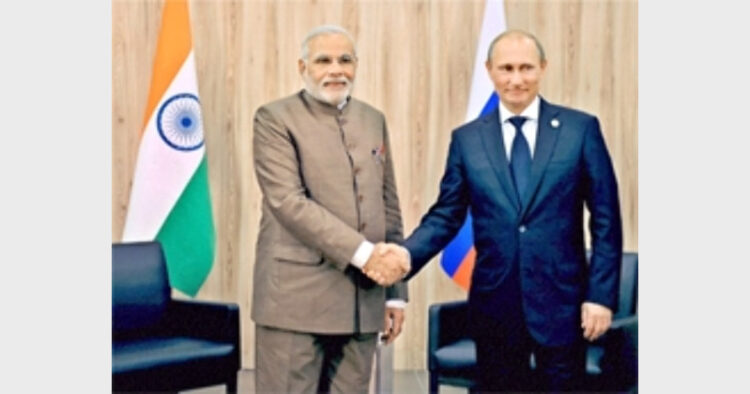Intro: India scored a diplomatic coup not just for herself but also for BRICS to become a robust global multilateral forum via institutions building.
 The current idea of ‘BRICS’ (Brazil, Russia, India, China, South Africa) owes its origin to the term ‘BRIC’ coined by noted global financial consultancy Goldman Sachs in 2001. The first Summit of BRIC was held in Russia in 2009 and it became BRICS (with inclusion of South Africa) in 2011. Soon it may become BRICSAM with possible inclusions of Argentina and Mexico in near future.
The current idea of ‘BRICS’ (Brazil, Russia, India, China, South Africa) owes its origin to the term ‘BRIC’ coined by noted global financial consultancy Goldman Sachs in 2001. The first Summit of BRIC was held in Russia in 2009 and it became BRICS (with inclusion of South Africa) in 2011. Soon it may become BRICSAM with possible inclusions of Argentina and Mexico in near future.
The strategic importance of BRICS both as a multilateral forum as well as an actionable alternative to the existing US dictated world order have increased manifolds with the increasing politico-economic cum military might of the BRICS nations. It represents a powerful nay invincible idea of building a multipolar and equitable world order which must become the reality of today’s global politics.
The end of bipolarity at the end of the dreadful years of Cold War did not result in a multipolar world. It eventually resulted in a US dominated unipolar world reeling under its hegemonistic policies of unilateralism both at the political level (i.e. war on terror, Iraq, Afghanistan etc) and at the economic level (WTO summits, World Bank/ IMF policies etc). In the event of absence of balance of power with no formidable competitors, the all powerful USA used to call the shots most of the time, if not always.
The emergence of the BRICS countries, therefore, is a welcome thing to happen for all of us Indians who have dreamed of achieving ‘Vasudhaiva Kutumbakam’- the eternal Hindu Philosophy of world peace and universal brotherhood and not war or chimera of becoming the global
hegemon.
Though India’s tryst with multilateral diplomacy is not new, the BRICS presents a golden opportunity for India like its co-members to pursue real politics of geo-economics with diminishing importance of geo-politics to build an alternative world order more sensitive to the issues facing the common interests of the ‘global south’ that considers India as its natural leader.
Although BRICS had five Summits earlier but thrust for giving institutionalised flesh on its conceptual skeleton has taken place in its sixth and most important Summit till date hosted by Brazil in 2014. This Summit also holds tremendous importance as it is the first major multilateral diplomatic mission of India’s newly elected Government under PM Narendra Modi. The Fortaleza Summit of BRICS served India with a rare opportunity to interact with the leaders of the four major powers outside the European or NATO blocs to strategise on the pivotal issues ensuring security, development and prosperity to the BRICS nations and the world at large.
Due to Modi’s untiring diplomatic efforts, the New Development Bank proposed by BRICS will serve as an alternative to the US-dominated bodies like World Bank and IMF.
In the light of Edward Snowden expose and numerous exposes by WikiLeaks, protecting cyber space from snooping holds strategic importance and India agreed with Russian sponsored idea of having an alternative ‘hack-proof’ BRICS Cyber Grid as a riposte to hitherto US controlled virtual world.
PM Modi held one to one meetings with the leaders of China, Russia, Brazil and South Africa. President Xi Jinping of China declared China’s urgency to amicably resolve the protracted border demarcation issue with India which came as a surprise or shock to the Indian strategic community as China always tries to do ‘delay cum deny’ game plan on this front. Sources told that Xi Jinping was highly impressed with Modi’s well articulated pre-talk diplomatic preparations as ice-breakers.
PM Modi while talking to Russian President Vladimir Putin highlighted India’s ‘tried-tested and trusted’ ties with Russia and sought more co-operations from Russia in augmenting India’s nuclear energy capacity as well as more joint collaborations in space and defence sector. His talks with President Dilma Rousseff of Brazil and President Jacob Zuma of South Africa were equally fruitful.
Indeed, India scored a diplomatic coup not just for herself but also for BRICS to become a robust global multilateral forum via institutions building. PM Modi via his astute BRICS diplomacy also pushed for India’s memberships in the Asia Pacific Economic Co-operation (APEC) and Shanghai Co-operation Organization (SCO) – two other equally important regional multilateral economic and security forums of continental Asia.
In short, PM Modi’s first tryst with multilateral diplomacy with BRICS nations is a grand success not just for India but also for the ideas/causes that shaped BRICS and for which it must always stand for.
-Sourabh Jyoti Sharma (The writer is a Strategic Analyst-cum-Independent Freelancer with Specialisation in International Relations and can be contacted at [email protected])














Comments